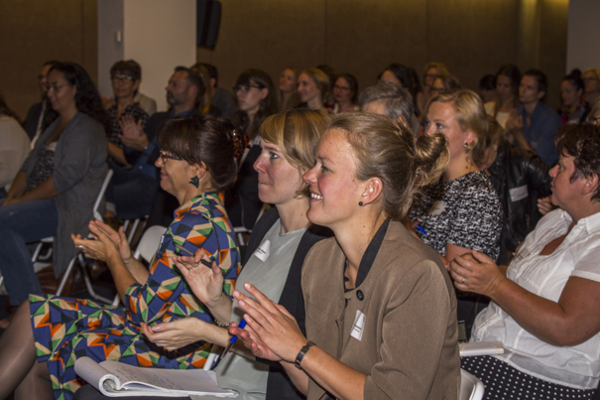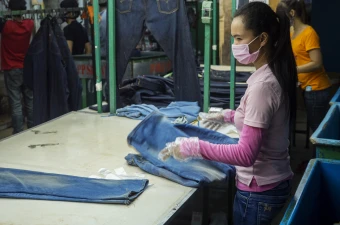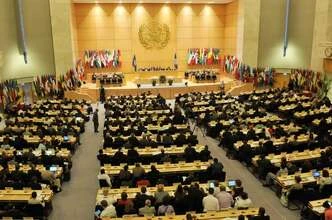
The Sustainble Textiles Labs is a series of short a series of short seminars on the issues that occur around making the textile- and apparel supply chain more sustainable for (Dutch) brands and retailers. Goal of this string of events is to inspire, inform, but above all to encourage companies to making concrete actions. The third edition of the Sustainable Textiles Lab, Living Wage: Beyond a number towards concrete actions for brand and factories, last 27 August was attended by over 70 apparel and textile professionals. For this third Sustainable Textiles Lab, the Dutch National Plan of Action and CNV Internationaal joined in as special organizing party.
Apparel and textile professionals sharing concrete actions
Critical questions to the speakers where asked by the audience and the special Lab Panel, consisting of Jos Huber (Ministry of foreign affairs) and Janet Mensink, International Programme Coordinator Cotton and Textiles of Solidaridad.H&M – Dialogue with factories is key
H&M started with their sustainability effort in 1997. On the topic of Living Wage, they have introduced the Fair Wage Roadmap. This roadmap takes into account suppliers, factory employees, governments, but also other brands. Elin Åström explained that the dialogue with factories is key. H&M has local staff present, which makes this dialogue easier. The dialogue is beneficial to both parties and makes clear the business case. To work on this topic H&M cannot impose wages to factories, the wages should be result of collective bargaining. What they can and what they do, is being a fair partner, by, for example, planning production in advance. For this topic the aim is to work with 60 factories this year and scale-up. Some of the challenges have been to make the process inclusive, in a sense of cultural aspects. Communicating the results is still challenging. However for H&M this topic is work in process for the coming period.Expresso Fashion – Paying a living wage in stead of just minimum wage
Expresso has been a member of the Fair Wear Foundation since 2004. For them it is important to work with factories, where they do not just pay the minimum wage, but also a living wage. In 2012 Expresso participated in a pilot by the Fair Wear Foundation and CNV Internationaal with one of their long term suppliers in Macedonia where they have a 30% leverage. When starting this project, the commitment from both parties meant transparency from the supplier and commitment from the Expresso management, as Marieke Weemaes explained. The first assessment showed that the productivity did not need much improvement. In 2014 the pilot indicated that wages should be increased by 1ct per working minute. The Fair Wear Foundation verifies if the money is going to the employees of the factory. Working towards living wages does not only increase the quality of the lives of the workers, but will also benefit the quality of the products. For expresso it is not a best practice, it is a journey. Increasing leverage in factories would make it easier to work towards Living Wage, but will require some research on what is needed in terms of quality, price and social condition that are desired by the brand.Fair Wear Foundation – Step by step towards living wage with Fair Wage Ladder
“ If you ask ten people what a living wage should be, you would get ten different answers.”, explained FWF's Erica van Doorn. For FWF Living Wage would mean to meet basic needs of workers and their families like food, shelter, transport, clothing, education for children and health care. Some of the obstacles include competition law between factories, or how to work out the cost details. It is also not a quick fix. Brands and factories should join hands and work together on this topic. One of the most important success factor is to get top level / CEO commitment to really start working on Living Wage. The Fair Wear Foundation works with the Fair Wage Ladder, a joint initiave with CNV Internationaal, to step by step bridge the gap between minimum wage and living wage.Solidaridad - Living wage roadmap
Solidaridad presented the benefits of using a standard methodology called the Fair Wage Method. A pilot project has been started in China with two brands in order to test the effectiveness of this method.House of Commons Lab Panel debate – Working towards actions
For the second part of the event, Gijs Weenink (Debat Academy) led a lively House of Common’s style debate, were critical propositions on Living Wage were debated. The Lab Panel for this part of the afternoon consisted of Jolande Sap (Dutch National Plan of Action) and Anne van Lakerveld (Schuttelaar & Partners). Jolande and Anne named three debate winners, who had given the most practical answers, working towards actions. Conclusions Jos Huber, Ministry of foreign affairs called to all participants “The very ambitious target of the Dutch National Plan of Action of 120 companies by 2020 working with Living Wages in their supply chain, still needs some steps forward.” She also asked the participants to contribute to the Pakistan Conference on Living Wage in February of 2016. Jolande Sap, Dutch National Plan of Action, stated that brands should not loose themselves in all the different methods on Living Wage, but to be active and join the working group on Living Wage and all the other working groups in the Dutch National Plan of Action. Janet Mensink, Solidaridad, reflected on the day, thanking all participants for an inspiring session. Living Wage is a complex issue, but let’s not forget that it is a basic human right. We should all start working on this. “ It can be done!” Anne van Lakerveld, Schuttelaar & Partners, most important take-away of this afternoon was the importance of transparency and communication. We need more transparency on what happens before a garment is bought by consumers.Further actions recommended:
o Take part in the working group Living Wage of the Dutch National Action Plan o Visit the Fair Wage Portal of the Fair Wear Foundation o Would you like to be a part of the next Sustainable Textile Lab? Please contact Caroline Stoop at info@sustainabletextileslab.org About the Sustainable Textiles Labs The Sustainable Textiles Labs is a series series of short seminars on the issues that occur around making the textile- and apparel supply chain more sustainable for (Dutch) brands and retailers. The Labs are organized by Schuttelaar & Partners and Solidaridad. For this third Sustainable Textiles Lab, the Dutch National Plan of Action and CNV Internationaal joined in as special organizing party.The third edition of the Sustainable Textiles Lab, Living Wage: Beyond a number towards concrete actions for brand and factories, was attended by over 70 apparel and textile professionals. H&M and Expresso shared their best practices.
Publication date 10 09 2015


